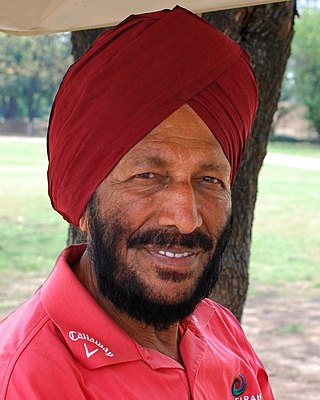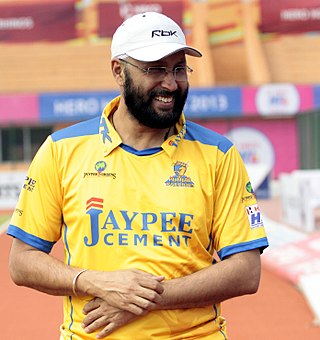Related Research Articles

Maharaja Sir Duleep Singh, GCSI, or Sir Dalip Singh, and later in life nicknamed the "Black Prince of Perthshire", was the last Maharaja of the Sikh Empire. He was Maharaja Ranjit Singh's youngest son, the only child of Maharani Jind Kaur.

The 1951 Asian Games, officially known as the First Asian Games, was a multi-sport event celebrated in New Delhi, India from 4 to 11 March 1951. The Games received names like First Asiad and 1951 Asiad. A total of 489 athletes representing 11 Asian National Olympic Committees (NOCs) participated in 57 events from eight sports and discipline. The Games was the successor of the Far Eastern Games and the revival of the Western Asiatic Games. The 1951 Asiad were originally scheduled to be held in 1950, but postponed until 1951 due to delays in preparations. On 13 February 1949, the Asian Games Federation was formally established in Delhi, with Delhi unanimously announced as the first host city of the Asian Games.

India first participated at the Olympic Games in 1900, with a lone athlete Norman Pritchard winning two medals – both silver – in athletics and became the first Asian nation to win an Olympic medal. The nation first sent a team to the Summer Olympic Games in 1920 and has participated in every Summer Games since then. India has also competed at several Winter Olympic Games beginning in 1964. Indian athletes have won 35 medals, all at the Summer Games. For a period of time, the Indian Men's Field Hockey Team was dominant in Olympic competition, winning eleven medals in twelve Olympics between 1928 and 1980. The run included eight gold medals of which six were won consecutively from 1928 to 1956.

William DeHart Hubbard was a track and field athlete who was the first African American to win an Olympic gold medal in an individual event: the running long jump at the 1924 Paris Summer games.

Ludhiana district is one of the 23 districts in the Indian state of Punjab. It is Punjab's largest district by both area and population. Ludhiana, the largest city in Punjab, is the district headquarters.

Khalsa College is a historic educational institution in the northern Indian city of Amritsar in the state of Punjab, India. Founded in 1892, the sprawling 300-acre (1.2 km2) campus is located about eight kilometers from the city-center on the Amritsar-Lahore highway, adjoining Guru Nanak Dev University campus, to which Khalsa College is academically affiliated.
Gurbux ("Gurbakhsh") Singh is a former Indian field hockey player who was a member of the Indian team that won the gold medal at the 1964 Summer Olympics, the bronze medal at the 1968 Summer Olympics and the gold medal at the 1966 Asian Games. He was the joint captain of the Indian team at the 1968 Summer Olympics. He was also the coach of the Indian team at the 1976 Summer Olympics. For his outstanding contribution to the country in the field of sports, Gurbux received the Arjuna Award in 1966.
Balkrishan Singh was a field hockey player from India who won the gold medal at the 1956 Summer Olympics.
Bhadaur is a town in Barnala district in the state of Punjab, India. It is part of the Bhadaur Assembly Constituency.

India competed at the 1924 Summer Olympics in Paris, France; this was the third Olympics where India participated. Some months ahead of the Olympics, in Feb 1924, the All India Olympic Games were held at Delhi. A few sportsmen from these games were selected to represent India at the 1924 Paris Olympics: Dalip Singh, Lakshmanan, Hinge, Hall, Pala Singh, Pitt, Heathcote, and Venkataraman. The Indian team eventually comprised seven athletes and seven-eight tennis players, with Harry Crowe Buck as manager. The team trained at the Madras (YMCA) College of Physical Education where Buck was founding principal.
Ajit Pal Singh Kular was an Indian professional field hockey player from Sansarpur, Punjab. He was the captain of the Indian hockey team. He was conferred the Arjuna Award in 1970, and awarded it in 1972. He played at centre half position. He was captain of the Indian team at the Hockey World Cup 1975 held in Kuala Lumpur, Malaysia.

The National Games of India consist of various disciplines in which athletes from the different states of India participate against each other. The country's first few Olympic Games, now renamed as National Games, were held in North India (Delhi, Allahabad, Patiala, Madras, Calcutta and Bombay.

Italian Sikhs are a growing religious minority in Italy, which has the second biggest Sikh population in Europe after the United Kingdom (525,000) and sixth largest number of Sikhs in the world. It is estimated that there are 220,000 Sikhs in Italy, constituting 0.33% of Italy's population.
Sardar Bahadur Governor BhaiUjjal Singh was an Indian politician who served as the Governor of Punjab, followed by acting Governor of Tamil Nadu. Prior to this he was a participant in the First Round Table Conference, opened officially by King George V on 12 November 1930.

Milkha Singh, also known as "The Flying Sikh", was an Indian track and field sprinter who was introduced to the sport while serving in the Indian Army. He is the only athlete to win gold at 400 metres at the Asian Games as well as the Commonwealth Games. He also won gold medals in the 1958 and 1962 Asian Games. He represented India in the 1956 Summer Olympics in Melbourne, the 1960 Summer Olympics in Rome and the 1964 Summer Olympics in Tokyo. He was awarded the Padma Shri, India's fourth-highest civilian honour, in recognition of his sporting achievements.

Prithipal Singh was an Indian field hockey player who played as a halfback. He was a member of the India national team that won a gold medal at the 1964 Tokyo Olympics, and silver and bronze at the 1960 Rome Olympics and bronze at the 1968 Mexico Olympics respectively.

Parattu Raveendran Sreejesh is an Indian field hockey player from Kerala who plays as a goalkeeper and former captain of the Indian national team.He is regarded as the World's best goal keeper of his generation. He plays in the Hockey India League for Uttar Pradesh Wizards. Sreejesh played a vital role in the Indian national team's bronze medal win at the 2020 Summer Olympics men's field hockey tournament. He won FIH Player of the Year Awards (2020–21) for best male goalkeeper. Since winning gold in 2014 Asian Games he won gold medal again in 2022 Asian Games in Hangzhou. He won a total of 16 international medals in his career until 2023 from Olympics, FIH Hockey World Championships, Commonwealth Games, Asian tournaments combined.
In India, the sport of athletics was introduced during the period of the British Raj. The sport is governed at national level by the Athletics Federation of India, which was formed in 1946. Despite its large population, few Indian athletes have won a medal in a global or major championship. This began to change in the 21st century, when Indians started taking greater interest in athletics more generally and improved facilities for the sport began to be built at a local level. At a continental level, it has been among the more successful Asian nations, though some distance behind China and Japan.

Jagbir Singh the former Indian field hockey Centre Forward represented India in two Olympics, 1990 World Cup and was a leading light of the Indian team in all the major tournaments, for a decade, from 1985–95, including two Asian Games, the 1989 Asia Cup & Champions trophy.

Balbir Singh Dosanjh, predominantly known as Balbir Singh Sr., was an Indian hockey player and coach. He was a three-time Olympic gold medallist, having played a key role in India's wins in London (1948), Helsinki (1952), and Melbourne (1956) Olympics. He is regarded as one of the greatest hockey players of all time, a modern-day Dhyan Chand, a legend of the sport, and is widely regarded as the sport's greatest ever centre-forward. His Olympic record for most goals scored by an individual in an Olympic men's hockey final remains unbeaten. Singh set this record when he scored five goals in India's 6–1 victory over the Netherlands in the gold medal game of the 1952 Olympic Games. He was often called Balbir Singh Senior to distinguish him from other Indian hockey players named Balbir Singh. Singh scored 246 goals from just 61 international caps
References
- ↑ "Dalip Singh". Olympedia. Retrieved 1 October 2021.